Support a Ceasefire
• Hands Off Libya! All U.S. Troops Home Now!
• The Security Council Resolution
• African Union High Panel on Libya Set for Nouakchott Meet
• Bahrain: U.S. Backs Saudi Military Intervention, Conflict With Iran
U.S. Aggression is Source of Humanitarian Crises Worldwide
Hands Off Libya! All U.S. Troops Home Now!
The U.S. Marxist-Leninist Organization (USMLO) calls on all to reject U.S. military aggression against Libya and to instead support the call for a ceasefire. The just and humanitarian action that serves all peoples including Americans is All U.S. Troops Home Now!
The U.S-led interference and aggression already underway with sanctions, military “aid” and Special Forces teams in place, and marines and bombers at the ready, are now to be increased. The recently passed United Nations (UN) resolution authorized a “no-fly zone” and use of “all necessary measures” against Libya. President Barack Obama, speaking March 18, emphasized that the resolution “authorizes the use of force with an explicit commitment to pursue all necessary measures to stop the killing.”
Experience present and past confirms there is no example worldwide where U.S. sanctions and use of military force have provided humanitarian aid or served the needs of the civilian population — not in Iraq, Afghanistan, Pakistan, not in Haiti, nowhere. Sanctions and now “no-fly zones” are acts of war that serve to greatly increase the violence and death facing civilians. U.S. use of force is a crime against the peoples and must be rejected and opposed.
We say NO! to use of force, violence and killing by the U.S.! To the U.S., NATO and all the imperialist powers we say Hands Off Libya! It is up to the people of Libya to decide their affairs. It is U.S. and foreign interference that directly blocks the ability of the people to decide for themselves.
Obama also emphasized that there will be no negotiation, that the U.S. dictates the terms and that military force will be used. Much like threats made to Saddam Hussein before the invasion of Iraq, Obama said Libyan leader “Moammar Qaddafi has a choice…A ceasefire must be implemented immediately.” Libya did support “an immediate ceasefire and an immediate stop to all military operations.” But Obama dictates that is not enough. Instead, Qaddafi must also “stop his troops from advancing on Benghazi, pull them back from Ajdabiya, Mistrata and Zawiya and establish water, electricity and gas supplies to all areas. Humanitarian assistance must be allowed to reach the people of Libya.” This last is another way of saying U.S. military teams already in place along Libya’s borders with Egypt and Tunisia must be permitted into Libya. The people of Haiti and New Orleans are well familiar with the military face and violence of such “humanitarian assistance.” And like in Iraq, where soldiers are no longer considered “combat” troops but instead are “training” Iraqis, these military “aid” teams are not considered “ground troops.”
Obama goes on, “Let me be clear, these terms are not negotiable. These terms are not subject to negotiation. If Qaddafi does not comply with the resolution, the international community will impose consequences and the resolution will be enforced through military action.” He adds, “That’s why I have directed Secretary Gates and our military to coordinate their planning…I have no doubt that the men and women of our military are capable of carrying out this mission,” of enforcing the “no-fly zone.” Both Pentagon head Robert Gates and Secretary of State Hillary Clinton made clear that such enforcement begins bombing Libya, which is what U.S.-style humanitarianism looks like.
It is clear that U.S. dictate over international affairs means violence is the weapon of choice. No negotiation, no respect for sovereignty, and any pretext involving civilians can be used to justify force and violence against the peoples.
The U.S. dictated UN resolution is also a means for the U.S. to retain domination in a situation where it is both colluding and contending with the European powers for control of resources and spheres of influence, in Libya and the region as a whole. As Obama put it, “The United States is prepared to act as part of an international coalition. American leadership is essential, but that does not mean acting alone — it means shaping the conditions for the international community to act together.”
Knowing the destructive power in the hands of the U.S., NATO and European powers, the world's people can predict the devastation enforcement of the “no-fly zone” will bring. Any interference by the U.S. and European powers in what has clearly become a civil war in Libya no matter what the pretext does not serve the cause of the peoples or peace and stability.
It is U.S. interference and aggression that is imposing violence and humanitarian crises worldwide. It is this interference that acts to block the peoples from sorting out the problems they face through their own efforts, using their own thought material and by mustering their own resources. To assist the peoples of Libya and those worldwide, the action required is to Bring All U.S. Troops Home Now! That is a humanitarian act contributing to peace and stability.
USMLO also condemns the U.S. double standards when it comes to opposing violence against civilians. For Libya, military intervention is justified with the claim of “protecting civilians.” In Bahrain, where tanks, bullets and helicopters are being used against unarmed protesters, Obama calls for “restraint.” He imposes not “regime change” but “regime adjustment,” for those governments doing the bidding of the U.S. And for Palestine, the U.S. funds and defends the siege of Gaza, which has imposed an outdoor prison and a years-long humanitarian crisis on more than a million civilians. The U.S. sanctions and pays for bombings, killings and daily Israeli violence against civilians, while also dictating that the UN not even condemn Israel, let alone call for an end to this rabid violence against civilians.As people across the country go into action in the coming weeks to defend worker’s rights and oppose the wars in Iraq and Afghanistan, let the stand on Libya be clear and firm:
Hands Off Libya! No Military Intervention! Support the Call for a Ceasefire!
Bring All U.S. Troops Home Now!
[TOP]
The UN Security Council Resolution
News agencies report that the United Nations Security Council (UNSC) on Thursday, March 17 voted on a resolution authorizing a “no-fly zone” over Libya and "all necessary measures" — code for military action — to protect civilians. Ten of the council's 15 members voted in favor of the resolution, while Russia, China, Germany, India and Brazil abstained. No votes were recorded against the resolution, which was co-sponsored by the United States, France, Britain, and Lebanon.
The aim of the resolution to take over Libya by getting rid of its present leader Colonel Qaddafi is evident in the authorization to take "all necessary measures."
Speaking in Tunis prior to the resolution's adoption, U.S. officials said that Washington, in a sharp shift in tone, wanted the United Nations to authorize not just a no-fly zone to aid Libyan rebels but also air strikes against Libyan tanks and heavy artillery. U.S. Secretary of State Hillary Clinton told the press, "It is important to recognize that military experts across the world know that a no-fly zone requires certain actions taken to protect the planes and the pilots, including bombing targets like the Libyan defense system."
The resolution:
"Authorizes member states ... to take all necessary measures ... to protect civilians and civilian populated areas under threat of attack in the Libyan Arab Jamahiriya, including Benghazi, while excluding a foreign occupation force of any form on any part of Libyan territory...;
"Decides to establish a ban on all flights in the airspace of the Libyan Arab Jamahiriya in order to help protect civilians;
"Calls upon all member states, acting nationally or through regional organizations or arrangements, to provide assistance, including any necessary over-flight approvals, for the purposes of implementing" the “no-fly zone.”
"Decides that the asset freeze imposed by (Resolution 1970) shall apply to all funds, other financial assets and economic resources which are on their territories, which are owned or controlled, directly or indirectly, by the Libyan authorities ... or by individuals or entities acting on their behalf or at their direction..."
According to Al Jazeera in Benghazi, "the main rebel stronghold," a large crowd watching the vote on an outdoor TV projection "burst into celebration as green and red fireworks filled the air."
Libya closed its air space to all flights after the UN Security Council (UNSC) passed the resolution, Europe's air navigation organization, Eurocontrol, said. It obtained the information from Maltese authorities who said "Libya does not accept any traffic until further notice," according to newswire reports.
Libyan government spokesman Mussa Ibrahim said, "[The resolution] would be illegal and immoral. It's an armed rebellion. Any country would've fought against that. They are basing their decision on media reports. This should not happen. It would harm the Libyan people. It would only strengthen our internal position because Libyans will have an external enemy and act as one."
Muammar Qaddafi is said to have told the Portuguese public Radiotelevisao Portuguesa, “The UN Security Council has no mandate. It has not got the right to interfere in the internal affairs of any state. It would be a flagrant colonization, without any justification. A serious and grave [inaudible]. This is craziness, madness, arrogance,...." he said.
Before the vote on Thursday, the Libyan defense ministry warned that any military intervention in Libya would endanger air and sea traffic in the Mediterranean Sea. However, after the resolution was passed, Libyan Foreign Minister Moussa Koussa, issued a statement announcing a ceasefire. "We decided on an immediate ceasefire and on an immediate stop to all military operations," he said, adding "[Libya] takes great interest in protecting civilians..." Koussa said that because his country was a member of the United Nations it was "obliged to accept the UN Security Council's resolutions."
Al Jazeera's correspondent in London, Paul Brennan, said the military preparations by international forces were going to continue regardless of Koussa's announcement.
"It could make it more difficult to actually launch attacks, but from the idea of preparation I don't think it's going to deflect the coalition forces at all. What they need to do at this early stage is get the forces into position so they can enforce a no-fly zone as authorized by the UN Security Council. They'll decide at some point whether they attack any forces on the ground and that will depend largely on what Qaddafi's forces are doing," he said.
U.S. Ambassador to UN Susan Rice and British UN Ambassador Mark Lyall Grant vote in favor of the resolution against Libya during an open meeting of the UN Security Council at the UN headquarters in New York, March 17, 2011.
The news agencies speak about an imminent attack against Libya "that could include France, Britain and possibly the United States." The three powers are reportedly scrambling fighter jets into position and Canadian media report that Canada is planning to send six CF-18 fighter jets "to join the military action against the Libyan regime."
The Obama administration readied plans to enforce the “no-fly zone,” with congressional officials describing a closed-door briefing in which the administration said it could ground Qaddafi's air force by Sunday or Monday, news agencies report. "The effort likely will involve jet fighters, bombers and surveillance aircraft, officials said, and the U.S. is keen to have Arab countries such as Jordan, Qatar and the United Arab Emirates participate in the operation."
French Foreign Minister Alain Juppe even went to the Security Council meeting to promote the resolution.
"France is very much involved in this action and has prepared the draft resolution. We have one goal: we want to stop the attacks by the Qaddafi regime against civilian populations." Juppe said. "And it's a question of days or hours because the pressure against Benghazi, especially, is now very tough."
AFP quoted Juppe as saying that military strikes could quickly follow after a UN Security Council resolution on Libya.
"From the moment the resolution is adopted, military actions could begin in the hours that follow," a French diplomatic source said.
Five members of the Arab League, including Jordan, Qatar, Saudi Arabia and the United Arab Emirates, have said they would intervene militarily, according to an AFP report, which quoted "diplomats" but did not elaborate.
China along with Russia, Brazil, India and Germany abstained from the vote, which permitted the U.S. to claim victory on the basis of a 10-0 vote. China's permanent representative to the UN Li Baodong explained China's abstention saying, "The continuing worsening of the situation in Libya has the great concern of China. We support the Security Council's adoption of appropriate and necessary action to stabilize as soon as possible the situation in Libya and to halt acts of violence against civilians."
"China has always emphasized that in its relevant actions, the Security Council should follow the UN Charter and norms governing international law and respect the sovereignty, independence, unity and territorial integrity of Libya and resolve through peaceful means the current crisis in Libya," Li said.
If we are to understand by this that China thinks the resolution does not uphold the principles of the UN Charter, why did China not vote against the resolution? The representative did not explain.
As for Russia, Russia Today quotes the Russian envoy Vitaly Churkin as saying that his country fears that the introduction of no-fly zones over Libya may lead to large-scale military intervention, which cannot fail to impact the civilian population. According to Churkin, the Security Council, in essence, left unanswered "specific and legitimate questions from Russia and other countries regarding how the no-fly zone regime would be ensured, and what are the rules and limits pertaining to use of force."
Moscow is convinced that the shortest path to security in Libya is through a cease-fire, not military invasion, said Churkin. This position was contained in a draft resolution tabled by Russia on March 16th. However, some Council member-states are too enthralled by "forceful means" of resolving the situation, Churkin said. This also does not explain why Russia did not exercise its veto.
By not voting against the resolution, the green light has been given for the all out violation of the UN charter and for Obama — who was being accused of dithering on Libya — to now claim a "brilliant achievement" with a 10-0 vote in favor of the all out attacks on Libya.
[TOP]
African Union High Panel on Libya Set for Nouakchott Meet
African leaders selected by the African Union (AU) to an ad-hoc panel on Libya will meet on 19 March in Nouakchott, the Mauritanian capital, to work out a peace roadmap, including an immediate ceasefire, the AU said. Presidents Jacob Zuma of South Africa, Yoweri Museveni of Uganda, Mohamed Ould Abdel Aziz of Mauritania, Amadou Toumani Toure of Mali and Sassou Nguesso of the Congo are expected to begin work on the Libyan crisis, the AU said. AU Commission Chairperson Jean Ping will also join the team, whose mandate is to immediately assess the situation in Libya and mobilize world support for an end to humanitarian crisis in Libya, the AU said in a statement Thursday.
The High-Level Committee on Libya was established during a Summit of the 265th session of the AU Peace and Security Council (PSC) meeting in Addis Ababa.
During its 19 March meeting, the Panel will determine the ways and means of implementing its mandate, the AU said.
"Following this meeting, the members of the Committee will undertake to engage the Libyan parties and assess the situation in Libya," the AU statement added.
The panel's work aims at leading an urgent African action to address the situation in Libya.
It will seek an immediate cessation of all hostilities. It will try to win the cooperation of the competent Libyan authorities to facilitate the timely delivery of humanitarian assistance to the needy populations and the protection of foreign nationals, including the African migrants living in Libya.
The panel is mandated to engage with all parties in Libya and assess the evolution of the situation on the ground, and facilitate an inclusive dialogue among the Libyan parties on the appropriate reforms.
The team will also engage the AU's partners, in particular the League of Arab States, the Organization of the Islamic Conference, the European Union and the United Nations, to facilitate coordination of efforts and seek their support for the early resolution of the crisis.
[TOP]
Bahrain: U.S. Backs Saudi Military Intervention,
Conflict With Iran
On March 14 Saudi Arabia and its Gulf Cooperation Council partner the United Arab Emirates deployed 1,000 troops, 500 security personnel and armored troop carriers across the 25-mile King Fahd Causeway to Bahrain to shore up their fellow monarchy after a month of protests against the Al Khalifa dynasty. The following day the Bahraini government declared a three-month state of emergency and authorized the military "to take necessary steps to restore national security." On March 16 government security forces staged a violent crackdown against protesters in the nation's capital with tanks, armored personnel carriers and helicopters, killing at least two people and injuring hundreds.
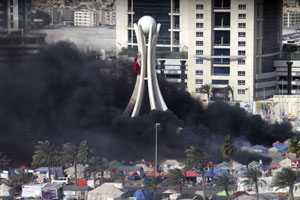  Smoke emanates from the tent city in Pearl Square on March 16, 2011 after government forces, backed by foreign troops, cleared the square. Recent protests at the square brought out more than 100,000 or a fifth of Bahrain's population. |
Two weeks earlier Egypt's Al-Masry Al-Youm newspaper reported that the Saudi government had sent an estimated thirty tanks to Bahrain.
In the interim U.S. Secretary of Defense Robert Gates visited Bahrain on March 11 and 12 and met with King Hamad bin Isa al-Khalifa and Crown Prince Salman bin Hamad bin Isa al-Khalifa. The first is Commander-in-Chief and the second Deputy Supreme Commander of the Bahrain Defence Force. The Bahraini monarch underwent military training with the British Army at the now-defunct Mons Officer Cadet School and later attended the United States Army Command and General Staff College at Fort Leavenworth, Kansas, graduating in 1973.
The Pentagon chief and former Central Intelligence Agency director was in the company of men who spoke his language.
Gates commented approvingly of his hosts:
"I am convinced they both are serious about real reform. I think that the concern now is that it's important that they have somebody to talk to, and that the opposition be willing to sit down with the government and carry this process forward."[1]
He praised the king's and prince's "willingness to engage with the opposition," lauding their efforts as "a model for the entire region" — the Middle East and North Africa. Bahrain lies directly across the Persian Gulf from Iran.
The Defense Secretary confirmed that there had been "much talk of Iran" between him and his royal interlocutors and added: "One of the issues under discussion with respect to Libya, obviously, is a no-fly zone.... If we are directed to impose a no-fly zone, we have the resources to do it." [ 2]
On March 7 the foreign ministers of the Gulf Cooperation Council member states — Bahrain, Kuwait, Oman, Qatar, Saudi Arabia and the United Arab Emirates — called for imposing a no-fly zone over Libya, with Emirati Foreign Minister Sheik Abdullah bin Zayed al-Nahyan emoting: "We appeal to the international community, especially the Security Council, to meet its historical responsibility to protect this dear people." A week after the above display of unconvincing solicitude, leading members of the organization sent troops to Bahrain to suppress protests against the hereditary autocracy.

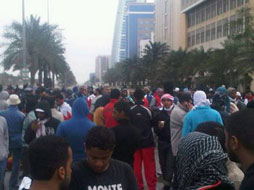
Protestors blockade the road as they march to the Bahrain Financial Harbour, March 14, 2011.
Last September the Financial Times reported that the U.S. had struck deals to provide four members of the Gulf Cooperation Council — Saudi Arabia, the United Arab Emirates, Kuwait and Oman - with $123 billion worth of arms in a dramatic move to confront Iran in the Persian Gulf. Saudi Arabia accounts for over half the total, $67 billion for 84 F-15 jets, 70 Apache gunships, 72 Black Hawk helicopters, 36 light helicopters and thousands of laser-guided smart bombs, the largest weapons deal in U.S. history. Even before those transactions are finalized, the Stockholm International Peace Research Institute documented last December that Washington accounted for 54 percent of arms sales to Persian Gulf states between 2005 and 2009 and France 21 percent.
Gates flew home to Washington on March 12 from the Bahraini capital of Manama, ending a trip that started in Afghanistan five days before, after which he went to U.S. Africa Command headquarters in Stuttgart, Germany where he officiated over the transfer of command from General William Ward to General Carter Ham, and to NATO Headquarters in Brussels where he engaged in two days of meetings with his 27 fellow Alliance defense chiefs and those of another 20 nations providing troops for NATO's International Security Assistance Force in Afghanistan.
Pentagon Press Secretary Geoff Morrell stated of U.S. relations with allies in the Middle East region: "All of the...deep strategic interests we have with them remain the same as they were six months ago."[3]
That Saudi military forces entered Bahrain two days after Secretary Gates left would lead any sensible person to draw the conclusion that the Pentagon chief had discussed more than Iran and Libya with the kingdom's top two government and defense officials. Though discussions on Iran would not have been unrelated to those concerning a U.S.-backed deployment of Saudi and other Gulf Cooperation Council forces to Bahrain, as some 70-75 percent of Bahrain's population is Shi'a Muslim by way of confessional background although the ruling family is Sunni.
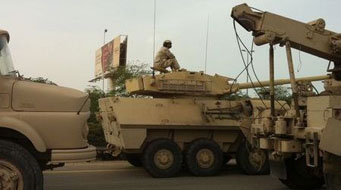
![]()

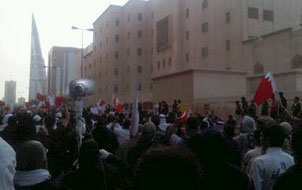
![]()
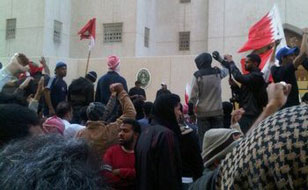
Troops from Saudi Arabia and other Gulf Cooperation Council nations invade Bahrain, March 14, 2011.
In response, thousands of Bahrainis stage a protest outside the Saudi embassy, March 15, 2011.
A Bahraini protester quoted by Reuters on March 15 commented on the Saudi-led military incursion this way: "It's part of a regional plan and they're fighting on our (land). If the Americans were men they would go and fight Iran directly but not in our country."
The U.S. Fifth Fleet, one of six used by Washington to patrol the world's seas and oceans, is headquartered near Manama, where between 4,000-6,000 American military personnel are stationed. Unlike Tunisia and Egypt, U.S. military partners but not hosts of American bases, Bahrain is vital to U.S. international military and energy strategy, and allowing a doctrinal affinity to in any manner augment Iran's influence in its Persian Gulf neighbor is anathema to the White House, State Department and Pentagon.
The Fifth Fleet's area of responsibility encompasses 2.5 million square miles of water, including the Persian Gulf, the Red Sea, the Gulf of Oman, the Arabian Sea and the Indian Ocean as far south as Kenya.[4] Aircraft carriers, destroyers and other warships are assigned to it on a rotational basis and the fleet is the naval component of U.S. Central Command, sharing a commander and headquarters in Bahrain with U.S. Naval Forces Central Command. Central Command's purview stretches from Egypt in the west to Kazakhstan, bordering Russia and China, in the east.
The Fifth Fleet has approximately 30,000 personnel stationed across the region.
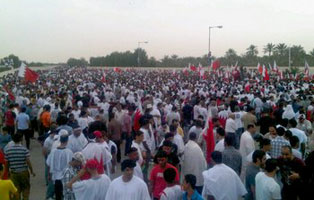 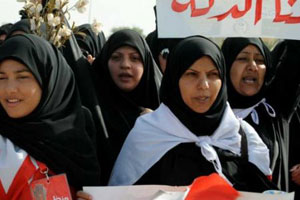 Demonstration outside Safriya Palace in Riffa, 20 km south of Manama where members of the royal family reside. Some 770 people were injured on March 11, 2011 when security forces and pro-government forces armed with swords and makeshift weapons attacked some 8,000 protestors heading towards the royal court, news agencies report. |
The geopolitical importance of Bahrain was demonstrated when the U.S.'s top military officer, chairman of the Joint Chiefs of Staff Admiral Michael Mullen, visited several nations in the Middle East and the Horn of Africa last month: Israel, Jordan, Saudi Arabia, Qatar, the United Arab Emirates, Djibouti and Kuwait, with a last-minute stop in Bahrain not listed on his itinerary.
Mullen inspected the Combined Joint Task Force — Horn of Africa at Camp Lemonnier in Djibouti, the first major American military base on the African continent, now assigned to U.S. Africa Command.
While in Saudi Arabia, he characterized Iran as "a country that continues to foment instability in the region and take advantage of every opportunity."
"There are always concerns in this region with Iran. Certainly the United States has them, as well as all the regional players. Certainly that was part of the discussion today [February 21] with the Saudis."[5] A discussion that was held with Prince Mohammed bin Nayef, Deputy Interior Minister; Prince Miteb bin Abdullah, commander of the National Guard; Prince Khalid bin Sultan bin Abdul Aziz al-Saud, Assistant Minister for Defense and Aviation; and Lieutenant General Husein Abdullah al-Qubail, Deputy Chief of the General Staff.
Mullen was cited as saying the talks "focused largely on the tumult in Bahrain," with him stating:
"Obviously the Saudis, in particular — but everybody in the region - is watching what's happening in Bahrain very closely."[6]
In Bahrain on February 25 he "reaffirmed our strong commitment to our military relationship with the Bahraini defense forces," according to his spokesman. He also commended the Bahraini royal family "for the very measured way they have been handling the popular crisis here," although several hundred protesters have now been killed and wounded, and praised the government for the "giant leaps" it has taken in recent years.[7]
Mullen visited the Marine Corps Forces Central Command [MARFORCENT] Forward element at the Naval Support Activity Bahrain base, home to U.S. Naval Forces Central Command and the U.S. Fifth Fleet. The new Marine headquarters "stood up in November to bring Marine Corps Forces Central Command what its other sister services already have: a forward element within the 20-nation Centcom area of operations."
"Exactly how many Marines ultimately will join the element is classified, but...developments underway" are seen "as a sign of MARFORCENT's long-term commitment to strengthening partnerships and protecting U.S. interests in the region."[8]
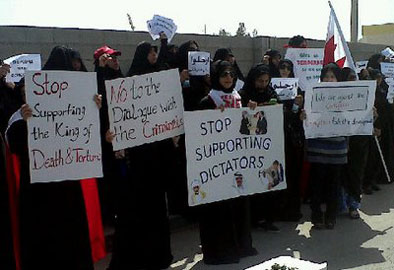
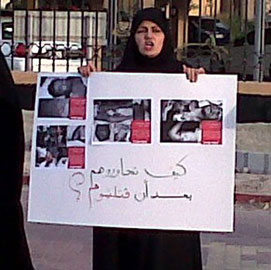
Protest at U.S. embassy, March 7, 2011.
Sign at right reads "How can you have a dialogue with the youth you killed?"
Ten days earlier North Atlantic Treaty Organization Deputy Secretary General Claudio Bisogniero addressed a conference in Qatar (immediately southeast of Bahrain), the fourth Ambassadorial Conference of NATO's Istanbul Cooperation Initiative, also attended by Secretary General Anders Fogh Rasmussen. Concerns expressed in Bisogniero's keynote address were capsulized by a local newspaper as follows:
"Gulf nations are crucial to world energy supplies and their security supplies are also important....Since 50 percent of world energy supplies transit through the Gulf region, it is Nato's main concern to ensure these supplies."[9]
The Istanbul Cooperation Initiative was created at the NATO summit in Turkey in 2004 to complement the upgrading of the Mediterranean Dialogue partnership with Israel, Egypt, Tunisia, Algeria, Jordan, Mauritania and Morocco to the level of the Partnership for Peace program that graduated twelve Eastern European candidates to full NATO membership from 1999-2009, an unprecedented seven at the Istanbul summit seven years ago, with new bilateral partnerships with Gulf Cooperation Council members Bahrain, Kuwait, Oman, Qatar, Saudi Arabia and the United Arab Emirates.
In NATO's words at the time: "NATO leaders decided to elevate the Alliance's Mediterranean Dialogue to a genuine partnership and to launch the Istanbul Cooperation Initiative with selected countries in the broader region of the Middle East."[10]
Last month NATO's second top civilian leader "welcomed Istanbul Cooperation Initiative (ICI) partners Qatar, Bahrain, Kuwait and the United Arab Emirates, showing his interest in deepening energy security and cooperation in the Gulf region also with Oman and Saudi Arabia."[11]
In 2008 a NATO-Bahrain Public Diplomacy Conference was held in Manama. "The Conference brought together the Secretary General of NATO, the North Atlantic Council, the Deputy Secretary General of NATO, the Chairman of the NATO Military Committee and NATO officials, with government representatives, academics and senior scholars from countries in the Gulf region invited in the Istanbul Cooperation Initiative."[12]
The groundwork has been laid for U.S. and allied military intervention in the Persian Gulf.[13]
The day after Saudi and Emirati military forces arrived in Bahrain, several thousand protesters descended on the Saudi embassy to demonstrate their opposition to the intervention. As the Reuters news agency reported, "Bahrainis are concerned that their tiny island could become a proxy battleground for a wider stand-off between the Sunni-ruled Gulf Arab countries, all U.S. allies, and Shi'ite-ruled Iran, a U.S. foe."
The Iranian Foreign Ministry referred to the foreign military deployment in Bahrain as "unacceptable" and the Bahraini king recalled his ambassador from Tehran in response.
Two years ago Saudi Arabia engaged in its true first war, that against Houthi militias in northern Yemen. On December 14 of 2009 BBC News reported that 70 Yemeni civilians had been killed in a Saudi bombing raid on the village of Bani Maan. Houthi sources on the same day claimed that "U.S. fighter jets have attacked Yemen's Sa'ada Province" and "U.S. fighter jets have launched 28 attacks on the northwestern province of Sa'ada."[14]
The U.S. is no less complicit in the Saudi military intervention currently underway in Bahrain. Pentagon spokesman Colonel David Lapan stated the U.S. had been "informed" of but not "consulted" on the Saudi deployment, but his verbal sleight of hand was solely intended to cozen the uninformed and unwary given the recent visits to Bahrain by the head of the Pentagon and America's top military commander, who decidedly were not there to discuss the weather.
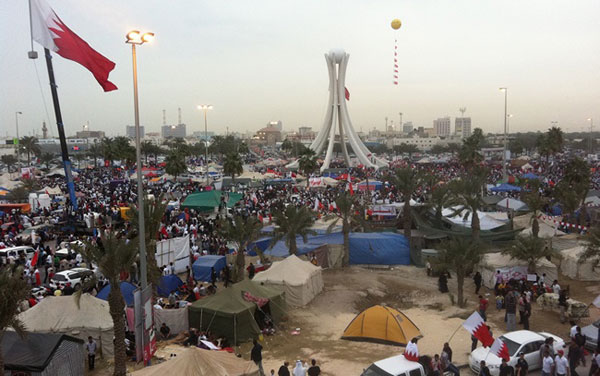

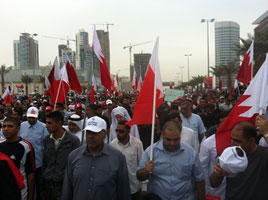
Mass rally in Manama, February 25, 2011 to honor the memory of those killed by state repression.
Notes
1. U.S. Department of Defense, March 12, 2011 [TOP]
2. Ibid
3. Ibid
4. Arabian Sea: Center Of West's 21st Century War, Stop NATO, October 25, 2010
5. U.S. Department of Defense, February 21, 2011
6. Ibid
7. Joint Chiefs of Staff, February 25, 2011
8. Marine Forward Element Set Up to Help in Middle East, U.S. Department of Defense, February 25, 2011
9. The Peninsula, February 16, 2011
10. North Atlantic Treaty Organization, June 29, 2004
11. Ibid
12. North Atlantic Treaty Organization, April 28, 2008
13. NATO's Role In The Military Encirclement Of Iran, Stop NATO, February 10, 2010
14. Yemen: Pentagon's War On The Arabian Peninsula, Stop NATO, December 15, 2009
